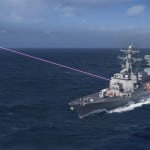
The head of Naval Reactors invited defense industry executives here Wednesday to think about how they’d contribute to a three-way effort to transfer nuclear submarine propulsion to Australia — but he didn’t invite any contributions. “We have 18 months to go and figure out how to deliver a platform, a capability, to Australia,” Adm. James Caldwell told attendees of the Naval Submarine League’s Annual Symposium in Arlington, Va. “I think initially this is going to be largely a government to…

 By
By 










